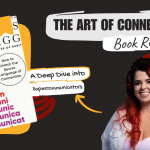Facebook is meant for social content. YouTube is meant for searchable content. Pretty simple, right?
However, I see real estate agent after agent wonder why certain videos don’t perform well on Facebook, or maybe they fail to understand the value in YouTube. After all – if you’re posting your videos to Facebook, why bother with Youtube?
To their defense, I have to admit I didn’t understand it either, until last month.
It came after interviewing Karin Carr on my podcast, Onion Juice Podcast. Karin, a REALTOR, explained how she closed six transactions in the last three months just from her YouTube Channel. You have to hear how – listen to the Episode by clicking here.
So what is she doing that others are not?
She understands and embraces Searchable Vs. Social Content. In fact, she doesn’t even share her YouTube videos on Facebook or any other social media platform! Wait.. what the what!!?
Here is how she looks at it:
A real estate “how to” video, real estate market report video, community video, or a first time buyer seminar video, for example, are all made for YouTube – where it is searchable. People who need this video are searching for it.
People on Facebook are generally there to be entertained not taught to about real estate. It would be like giving a first-time buyer seminar to an audience that is expecting to watch a reality tv show, concert, or sporting event.
All of these are made for Facebook: a video that asks for people’s opinion, a vlog that is entertaining, a house remodel show (like you would see on HGTV), a promo for a new listing, or a drone video. These are the right focus when the platform is social, where content is entertaining and generates engagement.
These are more for Youtube: a how-to video about how to stage your home for sale, a real estate report for recent home sales in your target (niche) area, a training video for what to expect when purchasing your first home. Focus on educational and searchable content for a platform focused on education and training.
Again – For YouTube create content that is educational and is searchable. For Facebook create content that is entertaining and engaging.
Do that and you’ll see your numbers improve.
Another way to look at it, as Jerry Potter said on the Onion Juice Facebook Group – “Creating searchable content is for people ready to buy/sell right now. Creating social content is for building relationships with people that will be ready to buy/sell a year from now. They’re both important, and both will have a much higher ROI if you know the difference.”
Are you following me so far?
Want to geek out some more and dig deeper into searchable content so you can break through on YouTube? Keep reading it’s about to get deep!
Here are 5 things you need to know about searchable (Youtube) content :
#1 Treat YouTube like a search engine, not like a social media platform.
This means you can use content to target a specific audience. For example, one video might target local homeowners looking to sell, while another might target local buyers looking for homes in your area or out of town buyers. Your content, title, tags, and keywords will all have an effect on how people find this content.
YouTube is often said to be the second largest search engine in the world after Google itself. Every day, people watch hundreds of millions of hours of video on YouTube, generating billions of views. Having a strong YouTube presence can have an incredible impact on your brand reach and will give you the chance to engage with the millions of visitors of using the platform.
YouTube is owned by Google. In real estate, we all know how hard it is to get ranked on the first page of Google because of syndication sites like Zillow, Trulia, or Realtor.com. However, Google will often sprinkle one or two videos into the first page when it thinks that the videos are highly relevant to a person’s search – And these videos come straight from YouTube. So the biggest benefit of creating YouTube videos is definitely SEO.
#2 Understand YouTube is a search engine that uses a specific algorithm you can follow.
When it comes to ranking YouTube content, TJ Kelly is the man with a plan. TJ manages Mxt Media, a Real Estate SEO and marketing agency outside Boston. I recently interview him on the Onion Juice Podcast and have hired him to help me with the launch of my YouTube plan. (listen to this episode here).
When YouTube first launched, part of the algorithm was based on views. The more views your video got, the higher it ranked. Now, YouTube uses a different approach. While they still count aggregate views they do so in conjunction with engagement metrics, which include number of seconds viewed, comments, likes and social shares.
TJ said before, it was better to pump out a ton of videos with less focus on content. Now, it’s better to create content-rich videos that drive user engagement.
The other factor is the total amount of minutes and seconds your video has been viewed. This is not per user, but overall. Therefore, having longer videos will add more seconds to your count and increase your rankings.
Yes, LONGER VIDEOS, you read that correctly!
#3 The three P’s of YouTube: Proof, Preview, Proof
The first 15 seconds will determine if a viewer will stay engaged, which TJ says is critical.
TJ recommends using the PPP method when producing content for YouTube.
Here’s what that looks like…
Preview: First, give the viewer a hint of what the video is all about as soon as the video starts.
Proof: Then, establish proof that you know what you’re talking about and can deliver on the topic.
Preview: Finally, reiterate what the video is about, this time adding a specific detail that the viewer will learn.
#4 SAY your keywords in the video
The latest algorithmic changes to Google’s search engines now take into consideration a more dynamic field of content types. As such, videos, images and transcriptions are now “crawl-able.”
Anything you say in a video (especially one that includes subtitles and annotations) can technically impact your ranking signals.
Putting your keyword into the title of your video while also saying your keyword throughout the video is a great way to drive home the point of what your video accomplishes, to both viewers and search engines.
In line with Google’s shift toward natural language search and high-relevancy content, matching auditory keywords within a video with those utilized in video titles signals that you’re not spamming users and that your video follows through on its title.
#5 – Customize video thumbnails
A newer differentiator that is becoming more common on YouTube is creative video thumbnails. Just last year, thumbnails were static images, but they now automatically animate when cursors hover over them.
If your video is featured on page 1, it’s likely facing stiff competition from other videos that may better serve viewer intent. So how do you get users to click on your video despite being ranked lower?
The key is to make a great first impression by having a customized thumbnail that stands out visually from everything else on the page.
Customization can take many forms, including appealing color schemes dynamic banners or design patterns, and Intuitive splash screen/video title combinations.
Again, please do yourself a favor. If you are producing videos for YouTube, focus on searchable content and don’t expect these videos to be the highest performers on Facebook. Maybe think about a different, entertaining take on a video you create for Youtube, and test that one out on Facebook instead of reposting the exact Youtube video. It will be interesting to see the difference- if you try this, share your results with us by commenting on this article! We’d love to hear from real estate agents trying this out for themselves.








Leave a Reply